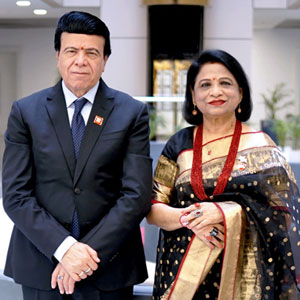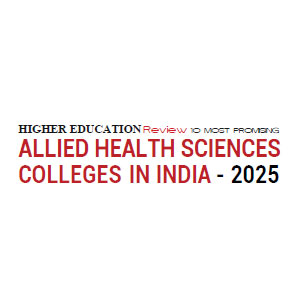
Chitkara University: Advancing Allied Health Education With Excellence & Innovation
By Dr Ashok K Chitkara, Chancellor, Dr Madhu Chitkara, Pro Chancellor
Allied Health Sciences education in India is undergoing rapid transformation, driven by advances in medical sciences, technology, and healthcare delivery systems. The growing importance of interdisciplinary teams in preventive, diagnostic, therapeutic, and rehabilitative care has highlighted the critical role of allied health professionals in patient outcomes. Major policy milestones are shaping this evolution.
The National Education Policy (2020) has introduced a competency-based, learner-centric approach supported by technology to meet global standards. The National Commission for Allied and Healthcare Professions (NCAHP) Act, 2021, aims to standardize education, accreditation, and professional conduct.
Institutions are increasingly focusing on hands-on, industry-integrated training to ensure job readiness, while expanding course offerings in response to advancements in diagnostics, genomics, surgery, and personalized medicine. Curricula now incorporate AI, health informatics, and research methodology, aligning with international benchmarks to enhance global mobility for Indian graduates.
In response to the pressing need for skilled healthcare manpower, Chitkara University established the Chitkara School of Health Sciences (CSHS) in 2011, dedicated exclusively to allied health education.
From the outset, it has combined theoretical learning with extensive clinical exposure through collaborations with leading healthcare providers, including Fortis Healthcare, Homi Bhabha Cancer and Research Hospital, Max Healthcare, Paras Hospital, and Sankara Eye Hospital.
CSHS offers a range of programmes in laboratory technology, radiology and imaging technology, operation theatre and anaesthesia technology, optometry, physiotherapy, and embryology, alongside doctoral studies in health sciences.
Its curriculum, backed by state-of-the-art infrastructure, industry partnerships, and a strong emphasis on research and innovation, ensures students graduate with advanced conceptual understanding, technical expertise, and professional readiness.
By aligning its programmes with industry needs and emerging healthcare trends, Chitkara University continues to prepare allied health professionals who contribute meaningfully to patient care and the future of healthcare in India.
Assuring Quality in Allied Health Education
CSHS plays a pivotal role in enhancing the quality of health sciences education in India through a rigorous curriculum design process. Guided by recommendations from the UGC, Ministry of Health & Family Welfare, national health policies, and global needs, the curriculum blends knowledge acquisition with skill enhancement in wellness, health promotion, disease assessment, and management.
Annual Board of Studies meetings, involving faculty, alumni, students, and industry experts, ensure that programmes remain relevant to local, national, and international healthcare priorities.
Aligned with Sustainable Development Goals, particularly SDG 3 (Good Health & Well-being), SDG 4 (Quality Education), and SDG 17 (Partnerships for the Goals), CSHS integrates ethics, gender sensitivity, human values, and sustainability into all courses.
Programmes combine core, value-added, and elective courses with hands-on training, communication skills, entrepreneurship, patient safety, and research methodology, reinforced through live projects, field visits, internships, and industry immersion.
The school’s uniqueness lies in its strong industry collaborations, state-of-the-art infrastructure, and active learning methodology that fosters problem-solving and clinical reasoning. Students benefit from seminars, workshops, symposia, and international conferences such as the annual IADT, as well as WHO-themed events.
Research and community outreach are central, with initiatives like the Erasmus+ OCULUS project, health check-up camps in adopted villages, and health awareness broadcasts on Chitkara FM 107.8.
CSHS also prioritizes holistic student development through scholarships, career counselling, competitive exam preparation, and alumni engagement, while encouraging participation in sports and cultural activities. With its blend of academic excellence, industry exposure, and community engagement, it equips students to excel as competent, compassionate allied health professionals.
Faculty & Modern Infrastructure
Chitkara School of Health Sciences upholds high teaching standards through a structured faculty selection and development process. Faculty members are chosen for their academic qualifications, teaching skills, and healthcare experience, and inducted via comprehensive orientation programs. Continuous professional growth is ensured through training sessions, workshops, and Faculty Development Programs, while performance is monitored through student feedback and academic outcomes.
Faculty are encouraged to maintain industry connections, engage in research, attend conferences, file patents, and upgrade qualifications, bringing real-world insights into the classroom.
CSHS is equipped with state-of-the-art infrastructure, including ICT-enabled, well-lit classrooms, a centralized ERP system, and a computer lab for research and learning.
The library houses over 6,000 books, journals, and online resources, complemented by well-equipped laboratories for hands-on training in disciplines like Medical Laboratory Science, Nutrition & Dietetics, and Optometry.
The inclusive campus features ramps, lifts, tactile paths, disabled-friendly washrooms, and modern amenities such as auditoriums, sports facilities, a gym, hostels, and transport services. With its blend of academic rigor, modern resources, and student-friendly facilities, CSHS fosters both professional competence and personal growth.
Student Preparation & Industry-Aligned Learning
At CSHS, student preparation begins from day one through an annual orientation programme that familiarises students and parents with the university, facilities, rules, and opportunities. The event includes interactions with alumni and industry experts, along with the allocation of faculty mentors who provide continuous counselling, skill development guidance, and motivation.
Motivational sessions, peer learning through group projects, and activities aimed at enhancing critical thinking, emotional intelligence, and cognitive skills are integral to the learning process.
CSHS emphasises experiential learning to prepare graduates for independent decision-making in clinical settings, community health services, and research. Students gain enriched clinical exposure through educational visits, workshops, and skill development activities. The teaching approach is industry-aligned, with curricula regularly updated based on inputs from healthcare professionals.
Hands-on training is delivered through case studies, simulations, pre-internship modules, and internships, while guest lectures and workshops by industry experts provide real-world insights. Research projects and continuous feedback loops ensure that teaching methods and course content remain relevant, equipping students with the skills and confidence to excel in the healthcare sector.
The Path Ahead
CSHS aims to continually enhance the quality of education by aligning with evolving healthcare needs and NCAHP guidelines. The institute plans to strengthen industry partnerships, introduce more job-oriented courses, and expand interdisciplinary research for students and faculty. Teaching methods will integrate active learning, real-life case studies, group discussions, and hands-on training to promote critical thinking and decision-making.
Technology-enabled tools such as video-based learning, MOOCs (Swayam, NPTEL), and practice-based assessments will further improve engagement and skill readiness.
A strong mentoring system remains central to CSHS, with faculty mentors guiding students in academics, personal growth, and career planning. Weekly hospital visits provide essential clinical exposure, connecting theory with real-world healthcare practices.
The school’s MoUs with leading hospitals like Fortis Healthcare and Homi Bhabha Cancer Hospital facilitate clinical postings, observerships, and internships. A structured assessment framework, aligned with defined Course and Program Outcomes, ensures focused teaching and measurable learning progress.
Together, these initiatives create a practical, supportive, and career-focused environment, preparing students to excel in diverse healthcare settings.


